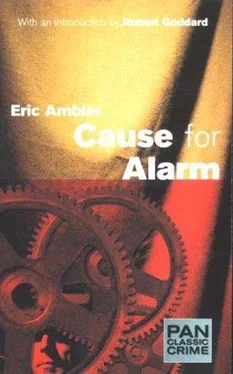Eric Ambler - Cause for Alarm
Здесь есть возможность читать онлайн «Eric Ambler - Cause for Alarm» весь текст электронной книги совершенно бесплатно (целиком полную версию без сокращений). В некоторых случаях можно слушать аудио, скачать через торрент в формате fb2 и присутствует краткое содержание. Жанр: Криминальный детектив, на английском языке. Описание произведения, (предисловие) а так же отзывы посетителей доступны на портале библиотеки ЛибКат.
- Название:Cause for Alarm
- Автор:
- Жанр:
- Год:неизвестен
- ISBN:нет данных
- Рейтинг книги:3 / 5. Голосов: 1
-
Избранное:Добавить в избранное
- Отзывы:
-
Ваша оценка:
- 60
- 1
- 2
- 3
- 4
- 5
Cause for Alarm: краткое содержание, описание и аннотация
Предлагаем к чтению аннотацию, описание, краткое содержание или предисловие (зависит от того, что написал сам автор книги «Cause for Alarm»). Если вы не нашли необходимую информацию о книге — напишите в комментариях, мы постараемся отыскать её.
Cause for Alarm — читать онлайн бесплатно полную книгу (весь текст) целиком
Ниже представлен текст книги, разбитый по страницам. Система сохранения места последней прочитанной страницы, позволяет с удобством читать онлайн бесплатно книгу «Cause for Alarm», без необходимости каждый раз заново искать на чём Вы остановились. Поставьте закладку, и сможете в любой момент перейти на страницу, на которой закончили чтение.
Интервал:
Закладка:
When he had gone I tried to read my evening paper. Herr Hitler had reaffirmed the principle of the Rome-Berlin collaboration. Signor Mussolini had made another speech from the balcony of the Palazzo di Venezia. The chairman of an armaments combine had announced complacently that profits for the previous year had proved extremely satisfactory and had expressed confidence in the future of the company. Another Balkan state had gone Fascist. A Croat living in the Paris suburbs had dismembered his mistress’s body with a hatchet. A banker had welcomed improved prospects for foreign lending. There were two pictures on the front page: one of two grinning and embarrassed soldiers riding on a new type of tank, the other of a famous statesman, looking like an apprehensive vulture with a fishing-rod in one hand and a very small fish in the other. On page four was an article entitled: “In thy strength, O Britain…” by an ex-naval officer who, I happened to know, was also a director of a naval construction yard.
I put the paper down, finished my tea and felt in my pocket for a match to light a cigarette. My fingers encountered the piece of paper. I drew it out, smoothed it on the table and read the advertisement through again very carefully.
REQUIRED by Midland firm. Thoroughly experienced production engineer to take charge of Continental office. Must speak fluent Italian and have had experience of high-production practice. Language qualification essential. Generous salary and commission to right man. Excellent prospects. Apply, stating age, experience (in detail) and when available, to Box 536X.
I don’t know what had possessed me to mark it. Maybe it was the bit about the Italian that had struck me as odd. After my parents had died I had shared a room with an Italian fellow-student who had taught me his language in exchange for mine. It had all been part of a plan to spend our summer vacation walking south from Naples. The plan had never matured. We had quarrelled a week before we had been due to start. But my Italian had remained, nourished by an occasional novel from Hachettes and, lately, vague ideas about a honeymoon in Rome.
I put the paper back in my pocket. It was out of the question, of course. Absurd. Claire, bless her heart, was talking nonsense.
But the fact that I put the paper back in my pocket instead of throwing it away was, I think, significant. Almost without my knowing it, the seed of the idea was swelling in my mind. That evening when I arrived at my flat, the seed bore fruit. There were two letters for me. Both had the word “regret” in the first line.
I had a bath, changed my clothes, sat down by the fire and lit a cigarette. For ten minutes I remained there, thinking. Then I got up. There was, after all, no harm in writing. It would probably come to nothing, anyway. Besides, even if I were offered the job, I could always change my mind.
“By the way,” I remarked casually later that evening; “just as a matter of interest, I’ve written for that Italian job. I wouldn’t take it, naturally, but there’s no harm in seeing what it’s all about.”
“I thought you’d be sensible, darling,” said Claire.
2
Four days later I received a letter from The Spartacus Machine Tool Company Limited of Wolverhampton. It was signed by a Mr. Alfred Pelcher, the Managing Director, and requested me to call upon him at Wolverhampton the following day. “Should,” the letter concluded, “our meeting not produce any result to our mutual advantage, we shall be pleased to refund to you the travelling expenses from London.”
That sounded fair enough. The following day I walked out of Wolverhampton station and asked to be directed to the Spartacus Works. After a bus ride and a ten-minute walk, I came to them, a dingy, sprawling collection of buildings at the end of a long and very muddy road. The view did nothing to raise my drooping spirits. Neither did my reception.
As I approached, a decrepit looking gate-keeper appeared out of a wooden office and asked my business.
“I want to see Mr. Pelcher.”
He sucked his teeth and shook his head firmly. “No travellers seen except on Tuesdays and Thursdays. It’s a waste of time to try other days.”
“I’m not a traveller. I have an appointment with Mr. Pelcher.”
He bridled. “Why didn’t you say so? I’ve got my job to do. I can’t be expected to know everything. I’m not,” he added unnecessarily, “a ruddy crystal gazer. Here”-he grasped my arm-“over there and up the stairs.” He indicated a flight of steel stairs set against the side of a black brick building on the opposite side of the yard and retired, muttering, to his office.
I thanked him, clanked up the stairs and pushed open a door marked “S ALES O FFICE AND E NQUIRIES. P lease walk in.” Beyond it was a small frosted glass window, labelled “K NOCK.” I knocked. The window slid open with a crash and a fat, pale youth with the beginnings of a moustache peered through at me.
“I want to see Mr. Pelcher.”
“Reps., Tuesdays and Thursdays,” said the youth severely. “There’s a notice at the gate. I don’t know what some of you chaps are coming to. It’s a waste of your time and mine. You can’t see him now.”
“I have an appointment.”
He shrugged. “Oh well! Name?”
“Marlow.”
“O.K.”
The window slammed again and I heard him asking over a telephone for Mrs. Moshowitz. Then: “Is that Mrs. Mo? This is your little Ernest speaking from the Sales office.” There was a pause. “Now, now! Naughty, naughty,” he went on playfully. He lapsed suddenly into the lingua franca of the gangster film. “Say, listen, sister. There’s a sucker here named Marlow. He claims he has an appointment with the Big Boy. Shall I let him have it in the stomach or will the Big Boy give him the works himself?” Another pause. “All right, all right, keep your stays on.” He slammed down the telephone, reappeared at the door and announced that he would himself take me across to Mr. Alfred’s office.
We descended the stairway, turned to the right along an alleyway littered with rusty scrap and climbed up another flight of stairs to a door with a Wet Paint notice hanging on the handle. My escort kicked the door open with his heel and informed the elderly and harassed-looking Jewess who glared at him indignantly across a sea of blue-prints that I was the man for Mr. Alfred.
This I was beginning to doubt. What I had so far seen of the Spartacus Machine Tool Company had impressed me so little that I was within an ace of leaving then and there, without seeing its Managing Director or troubling about my travelling expenses. I was a fool, I told myself, to have wasted a day on such a wild goose chase. But it was too late to think about that now. I was being shown into Mr. Alfred’s room.
It was large and very untidy. Stack upon stack of dusty files and tattered blue-prints formed a sort of dado round the green distempered wall, the upper part of which was decorated with many framed catalogue illustrations of machines and two yellowing gold-medal award certificates from Continental trade exhibitions. A coal fire smoked below a mantelpiece groaning under a pile of technical reference books, an Almanach de Gotha, a bronze Krishna mounted on a teak plinth and a partly concealed copy of Etiquette for Men. In one corner was a bag of golf-clubs. In the centre of the room, behind an enormous table strewn with labelled machine parts, correspondence trays, wooden golf tees, engineering trade papers and boxes of various sorts of paper clips, sat Mr. Alfred Pelcher himself.
He was a small, bald, cheerful man of about fifty with rimless, bi-focal spectacles and a soft, soothing manner which suggested that he had judged you to be in a very bad temper and was determined to coax you out of it. His dress-clearly the product of a compromise between the demands of a morning in the office and an afternoon’s golf-consisted of a black lounge suit jacket, a brown cardigan and a pair of grey flannel trousers. He had a habit of wrenching desperately at his collar as if it were choking him.
Читать дальшеИнтервал:
Закладка:
Похожие книги на «Cause for Alarm»
Представляем Вашему вниманию похожие книги на «Cause for Alarm» списком для выбора. Мы отобрали схожую по названию и смыслу литературу в надежде предоставить читателям больше вариантов отыскать новые, интересные, ещё непрочитанные произведения.
Обсуждение, отзывы о книге «Cause for Alarm» и просто собственные мнения читателей. Оставьте ваши комментарии, напишите, что Вы думаете о произведении, его смысле или главных героях. Укажите что конкретно понравилось, а что нет, и почему Вы так считаете.












